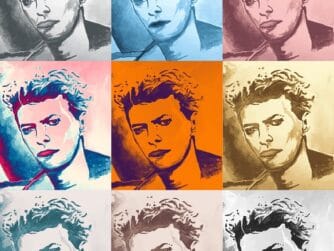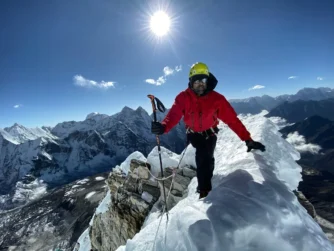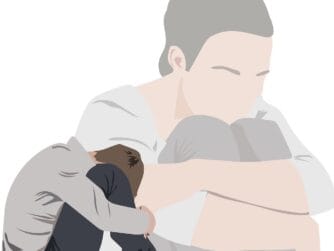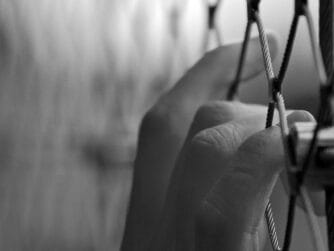Voice 1
Welcome to Spotlight. I’m Colin Lowther.
Voice 2
And I’m Megan Nollet. Spotlight uses a special English method of broadcasting. It is easier for people to understand, no matter where in the world they live.
Click here to follow along with this program on YouTube.
Voice 1
In 2020, a woman named Claire took a DNA test. This test was supposed to give Claire information about her family. It would tell her who her ancestors were. It could even tell her if she was at risk for diseases. But when she got the test back, she discovered something strange. The test showed that her family was not who she thought they were. She was not related to her parents.
Voice 2
Claire had been switched at birth. Claire was born at a hospital. While doctors in the hospital nursery were checking her health after her birth, she was accidently switched with another baby born the same day. This other baby was also having her health checked in the same nursery. Somehow someone put Claire in the crib with the other baby’s name. The medical staff accidently gave Claire to another set of parents. They gave another baby girl to Claire’s parents.
Voice 1
Claire had been switched at birth. Both Claire and the other girl grew up with each other’s biological parents. Both girls spent years believing they belonged in the other child’s family. But when each girl found out she had not been living with her true biological family, they both said they had a strange feeling that they did not exactly belong in the family in which they grew up.
Voice 2
Today’s Spotlight is on DNA testing and family. Is our family the people who gave birth to us, our biological mother and father? Is our real family the parents who raised us? Or is it something even more complicated?
Voice 1
The more she thought about it, the more Claire’s test made sense. Growing up, she did not look like anyone else in her family. She told the British Broadcasting Corporation, or BBC:
Voice 3
“I felt like a cheat. There were no similarities in looks or nature. I thought, ‘Yes – my parents must have gotten me from a different family.’”
Voice 2
For Claire, finding her family was helpful. Suddenly, things made sense for her. She was able to meet her biological mother and brother. But the meeting was difficult too. Claire got a new family. But she saw how different her life could have been. Claire said:
Voice 3
“My parents separated when I was very young. I do not remember them being together. I was raised in complete poverty, homelessness, often went hungry, and everything that goes with these things. It was a very difficult childhood.”
Voice 1
In many ways, she looked like her new family. She had the same DNA. DNA is the genetic code inside the cells of every person. DNA holds the instructions for how cells grow. During reproduction, a mother’s DNA combines with a father’s DNA to create a new person. This shared DNA is what makes us look like our parents. It is why we have eye color or hair color like our parents. It is why we walk or talk like our parents. Sometimes we may develop cancer, heart problems or other health issues just like our parents.
Voice 2
But in many ways, Claire did not feel like she belongs to her new family. She was 55 years old. She had grown up separately. Different people raised her. Who did she belong to? Who were her parents, really?
Voice 1
Claire’s answer is that she belongs to both families now. She still keeps in touch with her birth mother and with the mother who raised her.
Voice 2
What, then, is a family? For some, the answer is simple: it is the people who are biologically related to us. When Claire found her birth mother, she found her proper family. But others may find different answers to this question.
Voice 1
Alexis Hourslet is a podcaster. She discovered that the man who raised her was not her father. She spent long hours searching for her biological father. At first, their reunion was satisfying. Hourslet discovered many similar parts of their personalities. But Hourslet had been raised in a Mexican-American home. Her father was African-American. Their cultures were very different. Hourslet loved her father. But she had a difficult time feeling like she belonged in his family.
Voice 2
The truth is that families are complex. An ideal family would be a group that gives love, support, and stability to all the people within it. For some, this means their birth parents and their extended family – their grandparents, uncles, aunts, nephews, and nieces – all these biological kin are family.
Voice 1
For others, the answer is more complicated. There are those who grow up within families that are not ideal, for example, a young woman whose parents neglected her health or hurt her. This woman may look to other places for her family, perhaps a circle of very close friends. She may consider these friends her family.
Voice 2
Are they? Do we define what our family is? Or do our families define us?
Voice 1
DNA testing has opened up another way of looking at families. Most popular tests do not just tell you who you are related to. They can also tell you where your family came from many years ago. A DNA test might tell a man from the United States that he had ancestors from Sweden, Denmark, Germany, and Poland. Some of these histories may be lost to him. So a DNA test might show something about these unknown stories to him. DNA testing may present a way of connecting ourselves to a hidden past that we can be proud of.
Voice 2
Other DNA tests may even tell you famous people you are related to. Say a woman from China takes one of these tests. The test may show she is related to Gengis Khan. This Mongol leader ruled much of Asia in the thirteenth century.
Voice 1
Tests like this can make us feel special. But even DNA is more complex than we think. It is estimated that eight percent of the people in China are related to the Khan. This family would have more than 110 million people. Gengis Khan had many, many children. And, more people are closely related to each other than we think. Shai Carmi is a genetic researcher. He told The Conversation:
Voice 4
“The first thing to understand is how many ancestors you have in each past generation. One generation back, you have two ancestors. Two generations back, that doubles to four. Then eight, and, sixteen. By thirty generations ago, around the twelfth century, you have over a billion ancestors.”
Voice 2
Experts now believe that we all share a common ancestor. This ancestor may have been very recent. This ancestor probably lived only a few thousand years ago. This statistic parallels the teaching of the sacred books of the Jewish, Muslim and Christian people about Adam and Eve and the beginning of human history.
Voice 1
Nathan H. Lents teaches life sciences at John Jay College. He estimates we are all cousins one hundred and twenty times removed. This means that we would all be related one hundred and twenty generations ago.
Voice 2
What does this mean for people trying to find their family? Not much, really. These ancient ancestors have little similarity to who you and I are today. Recent ancestors, such as grandparents and great grandparents, are much more important to know. Their genes still affect who you are, along with their customs, traditions, and expectations. However, that ancient DNA may show one important factor: that we are not so different after all. Lents explains.
Voice 5
“Our particular ancestry should not be called a family tree. It is not an independent structure with its own roots. It is just one branch, not all that different from the others, on the larger tree of the one human family.”
Voice 1
The next time you walk down the street, picnic in the park, shop in a market, crowd onto a subway or bus, or see a visitor from another country, smile. Smile because you are looking at another member of your human family. Many generations ago, you shared the same ancestor. And now you have the opportunity to meet each other and say, “Hello. I am glad to meet you.”
Voice 2
Have you ever taken a DNA test? What did it tell you? Do these DNA tests help you to know your family better? How do you define “family”? You can leave a comment on our website at www.spotlightenglish.com. You can also find us on YouTube, Facebook, Instagram, and X. You can also get our programs delivered directly to your Android or Apple device through our free official Spotlight English app.
Voice 1
The writer of this program was Dan Christmann. The producer was Michio Ozaki. The voices you heard were from the United Kingdom and the United States. All quotes were adapted for this program and voiced by Spotlight. This program is called, ‘Finding Your Family’.
Voice 2
We hope you can join us again for the next Spotlight program. Goodbye.
Question
Have you ever taken a DNA test? What did it tell you? Do these DNA tests help you to know your family better? How do you define “family”?








Interesting….
Of course, we’ve all been related for one hundred and twenty generations, but the wonderful thing is that each new life is a completely new and original project, similar but not identical to its parents. Like the stars in the sky, we are billions of people, but each one is different from all the others, like a work of art, and this is its beauty and value. Every human being has absolute value because they are unique and unrepeatable; there never has been and never will be another like them, therefore every life is equally important and none is more important than the others.
I am Severino Ramos da Silva. I am from Brazil, and I live in São Paulo
Dear Colin Lowther, Megan Nollet, and Michio Ozaki
How are things with you?
Finding Your Family
Question 1 –
Have you ever taken a DNA test?
Never.
I am always certain that Izabel and José are my parents. I like them, and I have a lot of love and care for them.
Unfortunately, my father passed away a long time ago, but that is life.
We are born, and after we die.
However, my physical appearance and my attitudes are very different from my parents.
Furthermore, I would not take a DNA test to prove that they are my true parents, because I am very sure that they are my dear parents.
Even though they were not my true parents, I will love them in the same way.
When I was a child, I used to ask my grandparents why my father was very tall and I was short.
So my grandparents answered me, my dear, it happened because you are a little boy yet. Did you understand, kid? Yes, grandparents. I did.
Question 2-
What did it tell you?
Well, the DNA test there is to find the true family of someone or their parents. Also, fingerprinting is a DNA method of finding the particular pattern of genes in a person, particularly to identify somebody or find out if somebody has committed a crime.
Question 3 –
Do these DNA tests help you to know your family better?
Yes, they do.
But to me, I am sure that Izabel and José are my true parents. I would never take a DNA test to prove that. If I were to do a DNA test to prove that, I would be betraying them by their backs. I like my parents, and I respect them.
Question 4 –
How do you define “family”?
A family, I define it as a bird’s nest where they build their own house with some small pieces of wood, feathers, leaves, and others to lay their eggs and raise their new family.
Thank you very much for bringing us one more important article.
I appreciate it.
Stay with God.
Severino Ramos.
This other baby was also having her health checked in the same nursey.
It appears to me that the word “nursery” is written in the above sentence without the “r” I wish this could be corrected. Thank you very much.
Thanks for catching that error. It has been corrected.
I can’t do DNA because the costs are very high in my country, but it’s the best way to learn about the family. In my opinion, it’s very effective.
I haven’t taken a DNA test.
I think family is something deeper than biology. To me, family means anyone who shares love, care, and life with you, and supports you. It’s like the relationship between a husband and wife — they love and care for each other and choose to be together, even without a biological connection.
Learne